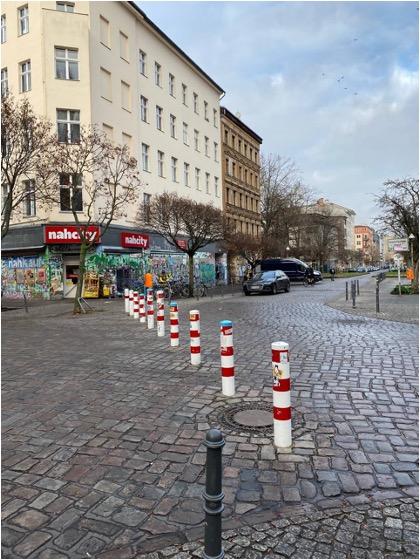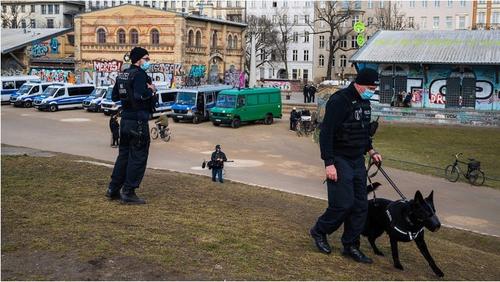Research Projects
FINISHED PROJECTS:
Neuer Lokalismus: Ressource friedlicher Konfliktbearbeitung in Stadt und Land
Abstract:
Growing social and political polarization and normalization of group-related misanthropic attitudes, diagnosed for many societies of the Global North, deepen already existing intra-societal conflicts and fractures. Meanwhile, ever more attention is paid to the local scale and its presumed potentials for social conflict transformation. Currently, very different forms of recollecting ‚the local‘ in everyday practice can be observed, which often is accompanied by attempts to resolve societal divergences that, from a socio-theoretical point of view, can be located on completely different, higher scales. The rediscovery of the neighborhood by practices of exchange and solidarity is one example, as is the mobilization of local identities by radical right-wing actors. We understand such forms of recollection of the local, expressed online as well as offline, as „new localism“. Neither its potential for conflict transformation nor the dangers it may entail in terms of deepening existing social fractures have been systematically investigated so far. The project is therefore dedicated to identify conditions under which localist practices and discourses can promote peaceful intra-societal conflict transformation. In doing so, our hypothesis is based on considerations from international academic debates and states that localist practices can be either (more) participation-oriented or (more) identity-oriented, and that localist discourses can have both (more) communitarian and (more) cosmopolitan characteristics – each with specific implications for conflict transformation capacity. As case studies the project investigates four local conflicts, which ignite around questions of international (forced) migration and/or motorized individual transport.
Prof. Dr. Antonie Schmiz
Institut für Geographische Wissenschaften
Freie Universität Berlin
antonie.schmiz[at]fu-berlin.de
Prof. Dr. Henning Nuissl
Angewandte Geographie/Raumplanung
Humboldt-Universität zu Berlin/Geographisches Institut
henning.nuissl[at]geo.hu-berlin.de
Research associate:
Dr. Özge Yaka
Institut für Geographische Wissenschaften
Freie Universität Berlin
oezge.yaka[at]fu-berlin.de
Student assistant:
Anna Lukoschus
Institut für Geographische Wissenschaften
Freie Universität Berlin
a.lukoschus[at]fu-berlin.de
Project duration: April 2022 - April 2024
The project is funded by Deutsche Stiftung Friedensforschung (DSF)
------------------------
“Solidarity Cities between local contestations and transformations in the European border regime.” (dissertation project Stephan Liebscher, working title)
Researchers increasingly scrutinize and theorize migration, urbanism and post-migrant, solidarity-based projects. However, so far the relationship of these initiatives to local institutions and their contribution to the transformation of urban migration regimes has scarcely been examined in geographic migration research. The project addresses this gap by developing a theoretical-conceptual perspective on the intersections of critical transformation research and critical-geographic migration and border regime research, the significance of which is underpinned by empirical case studies. The focus on the triad of 'methodologies, procedures, and design' will serve to produce novel geographical perspectives on current lines of development in urban migration regimes. The central question here is how actors in spatially effective practices shape urban transformation towards a post-migrant society.
------------------------
MAPURBAN: Migrant Mobility and Access to Public Urban Resources
Project duration: April 2021 - December 2022
Project description and results: https://research.kent.ac.uk/mapurban-eu/
MAPURBAN Berlin pursues two objectives: on the one hand, we aim to capture an institutional policy perspective by conducting expert interviews with governmental and non-governmental actors. On the other hand, the focus is on the inclusion of subaltern perspectives. For this purpose, we plan to conduct a series of participatory mapping workshops with people in and around refugee shelters. These will take place in three BENN neighbourhoods. The preparation and implementation of the participatory mapping workshops will be realised together with the collective orangotango and Dr. Ingeborg Beer as well as the Berlin Senate Department for Urban Development and Housing.
The workshops aim to achieve the following goals:
- Identify relevant and missing infrastructures in the neighbourhood and beyond from an individual perspective.
- Map subjective perceptions of public space in intersectional perspective in order to reveal similarities and diverging views.
- Address structural and individual difficulties of orientation and access to important urban resources.
- Publish the workshop results in order to give participants as well as the wider public and policy makers the opportunity to understand the limits of access to resources and to initiate appropriation processes.
The exhibition "Mapping Arrival" was part of the project MAPURBAN. For more information please find the brochure of "Mapping arrival" here .
MAPURBAN Berlin Research Team
Head of subproject FU Berlin: Prof. Dr Antonie Schmiz
Berlin Research Coordinator: Sylvana Jahre
The project is funded by JPI Urban Europe, Horizon 2020, ESRC, FORMAS and DFG.
-----------------
KoopLab: Participation through Cooperative Open Space Development
Collaborating to Develop “Arrival Neighbourhoods”
project duration: 2018 - September 2021
The growing diversity in German cities calls for new approaches to cultivate social cohesion. Can urban open spaces help us foster a communal life characterized by dialogue and neighborly solidarity?
Guided by this question, KoopLab is testing innovative methods of cooperative open space development to unite residents at each of our three project locations. The project has already brought together a network of scholars, urban planners, housing association professionals, city administrators and civil society associations. The spatial focus of KoopLab lies on so-called “arrival neighborhoods”, which are characterized by social disadvantage, migration and high housing density.
KoopLab wants to develop project locations together with residents in order to learn more about the transformative potential of open spaces. In cooperation with municipalities, companies and civil society actors, we work in three urban laboratories in the cities of Dortmund, Hanover and Leipzig. Together with local people, ideas for the design of open spaces are developed and cooperatively implemented. In this way, places of encounter and negotiation of interests are created that open up opportunities for social participation, strengthen social cohesion and improve the socio-ecological transformation of the neighborhoods.
More information: https://dortmund-nordwaerts.de/portfolio-item/kooplab/.
Project lead: Prof. Dr. Antonie Schmiz
Project coordination: M.A. Sebastian Schrader
Project lead Hanover: M.A. Lea Molina Caminero
--------------------
KultMIX: CULTURAL PRODUCTION IN THE MIGRATION SOCIETY
project duration until September 2022
KultMIX is a research project initiated by the Institute for Migration Research and Intercultural Studies (IMIS) at the University of Osnabrück. Its aim is to examine the manner in which cultural institutions formulate, discuss and implement positions and concepts regarding the migration society. The project's emphasis lies on the change within institutions: In which way are institutions themselves undergoing changes caused by migration and an increasingly diverse society? KultMIX focusses on four subject areas in four locations: Theaters, museums, cultural policy/administration and the independent culture scene in Osnabrück, Hamburg, Sindelfingen and Dresden.
KultMIX is financed by the Federal Ministry of Education and Research (BMBF), specifically through its funding line “Migration and Social Transformation”.
More information: https://kultmix.org/en/

